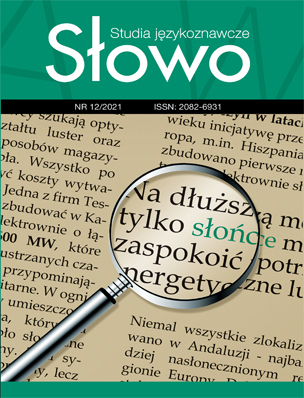Zanikanie liczebników zbiorowych jako świadectwo przemian społeczno-kulturowych (na przykładzie języka uczniów)
DOI:
https://doi.org/10.15584/slowo.2021.12.10Słowa kluczowe:
numerals, collective numerals, noun, pluralia tantum, inflectionAbstrakt
This paper consists of two parts – theoretical one and analytic one. In the first part the socio-cultural background of changes taking place in the Polish language during several dozen years was drawn and the subclass of collective numerals was characterized taking into account inflection, semantics and syntax. In the second part, the results of the survey conducted among students were presented. Its aim was to explore the competition of using collective numerals among the young generation of users of the Polish language. The analysis of the data collected allowed to draw a conclusion that collective numerals are a disappearing group of words. What is more, the users of the Polish language create many ways of avoiding the use of collective numerals, such as: using nouns derived from numerals (e.g. trójka), using analytical constructions (e.g. dwie pary spodni), replacing collective numerals by cardinal numerals or using nouns which do not connect with collective numerals.Downloads
Bibliografia
Bańko M., 2002, Wykłady z polskiej fleksji, Warszawa.
Butter D., Kurkowska H., Satkiewicz H., 1976, Kultura języka polskiego, Warszawa.
Dąbrowska A., 2014, Język polski w ćwierćwieczu wolności (1989–2014) [w:] Język polski 25 lat po przełomie. Die polnische Sprache – 25 Jahre nach der Wende, red. D. Scheller-Boltz, Hildesheim, s. 23–54.
Jadacka H., 2004, Liczebnik [w:] Wielki słownik poprawnej polszczyzny, red. A. Markowski, Warszawa, s. 1601–1605.
Jadacka H., 2005, Kultura języka. Fleksja, słowotwórstwo, składnia, Warszawa.
Karpowicz T., 1998, Stan świadomości normatywnej w kwestii posługiwania się liczebnikami zbiorowymi, „Poradnik Językowy”, z. 4–5, s. 12–22.
Kucała M., 1974, Część swojego 144 rodzeństwa, ,,Język Polski”, z. 2, s. 75–77.
Kucała M., 1978, Dopisek do B. Grzeszczuk „Liczebniki zbiorowe”, „Język Polski”, z. 1, s. 29–30.
Kurek H., 2014, Nominatywizacja we współczesnej polszczyźnie – upraszczanie czy likwidacja fleksji nominalnej [w:] Bogactwo współczesnej polszczyzny, red. P. Żmigrodzki, S. Przęczek-Kisielak, Kraków, s. 13–24.
Kurek H., 2016, Globalizacja a przemiany polskiej fleksji nominalnej [w:] Globalizacja a przemiany języków słowiańskich, t. 2, red. H. Kurek, M. Peplińska, M. Święcicka, „Bydgoskie Studia nad Pragmatyką Językową”, Bydgoszcz, s. 131–139.
Laskowski R., 1999, Liczebnik [w:] Gramatyka współczesnego języka polskiego. Morfologia, t, 1, red. R. Grzegorczykowa, R. Laskowski, H. Wróbel, Warszawa, s. 341–351.
Markowski A. red., 2004, Wielki słownik poprawnej polszczyzny, Warszawa.
Markowski A., 2012, Kultura języka. Teoria. Zagadnienia leksykalne, Warszawa.
Mieczkowska H., 1996, Liczebniki na co dzień, Kraków.
Nagórko A., 2003, Zarys gramatyki polskiej, wydanie VII, Warszawa.
Nitsch K., 1950, Odpowiedzi Redakcji, ,,Język Polski”, z. 2, s. 94–95.
Ożóg K., 2014, Współczesna polszczyzna wobec zmian kulturowych przełomu XX i XXI wieku [w:] Słowiański dialog kulturowy. Studia leksykalne i gramatyczne, red. W. Śliwiński, G. Olechowa, A. Račákova, Banská Bystrica, s. 16–35.
Saloni Z., 1977, Kategorie gramatyczne liczebników we współczesnym języku polskim, „Studia gramatyczne”, t. 1, Wrocław, s. 145–173.
Satkiewicz H., 2001, Rozwój fleksji w polszczyźnie XX wieku [w:] Polszczyzna XX wieku. Ewolucja i perspektywy rozwoju, red. S. Dubisz, S. Gajda, Warszawa, s. 95–101.
Siuciak M., 2018, Działalność normatywna wobec problemu zmienności języka [w:] Wybrane aspekty badań nad normą językową, red. P. Zbróg, Kraków, s. 107–119.
Stefańczyk W.T., 2018, Znikające klasy gramatyczne. Liczebnik zbiorowy w teorii i praktyce [w:] Wybrane aspekty badań nad normą językową, red. P. Zbróg, Kraków, s. 121–133.
Zieniukowa J., 1992, Problemy morfologii i znaczenia liczebników w językach słowiańskich. Polskie i rosyjskie liczebniki zbiorowe [w:] Synchroniczne badania porównawcze systemów gramatycznych języków słowiańskich. Zbiór studiów, red. I. Grek-Pabisowa, E.N. Smirnowa, Warszawa, s. 83–101.
Pobrania
Opublikowane
Jak cytować
Numer
Dział
Licencja
Prawa autorskie (c) 2021 Słowo. Studia językoznawcze

Utwór dostępny jest na licencji Creative Commons Uznanie autorstwa – Użycie niekomercyjne 4.0 Międzynarodowe.


